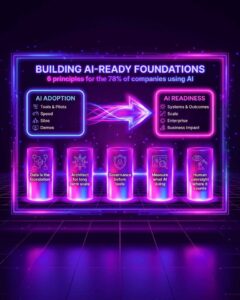Big Data Predictions 2025 and Beyond
The big data revolution shows no signs of slowing down, with its impact growing across industries. The market’s rapid expansion brings both opportunities and challenges for businesses and professionals alike. As organizations seek candidates skilled in diverse aspects of big data, the demand for certifications and specialized training continues to rise.
Let’s explore the future of big data and how it’s reshaping industries, enabling innovation, and creating new possibilities.
What’s on the Horizon for Big Data?
- Big Data in the Cloud: Reaching New Heights
The anticipated surge in big data—projected to exceed 59 trillion gigabytes—has driven organizations to adopt cloud-based solutions for improved scalability and efficiency.
- Hybrid Cloud Deployment: By separating sensitive on-premises data from general workflows, organizations can enhance control and security.
- Data Fabric Architecture: This approach allows for seamless integration, access, and management of various datasets.
Key Benefits:
- Improved accessibility and redundancy
- Strengthened data security
- Cost efficiency and compliance
- Machine Learning Revolutionizing Big Data
Machine learning (ML) is fundamentally changing how data is processed and analyzed.
- ML models empower systems to learn from historical data, providing real-time insights.
- Applications range from fraud detection and autonomous vehicles to advancements in healthcare and retail analytics.
Key Drivers for the Future of Big Data
- Increasing Demand for Data Scientists and CDOs
- Data Scientists: Employment in this field is projected to grow by 35% by 2032 (BLS), as these professionals are crucial for statistical analysis and programming.
- Chief Data Officers (CDOs): Their role focuses on ensuring data quality and formulating strategies to maximize data utility.
- Privacy: The Foundation of Big Data
The vast amounts of data come with significant privacy concerns.
- Organizations must implement robust data governance policies to safeguard sensitive information.
- Cloud platforms provide enhanced encryption and compliance solutions to reduce risks.
Big Data Strategies for Businesses
- Rapid and Actionable Insights
Businesses can utilize big data to obtain immediate, actionable insights through:
- Pattern recognition
- Clear communication of findings
- Establishing centralized data repositories
- Developing Effective Business Strategies
To maintain competitiveness, organizations should adopt a structured approach:
- Align with Business Initiatives: Ensure data analysis aligns with business objectives.
- Validate Use Cases: Thorough testing helps avoid costly mistakes.
- Adopt Cloud Storage Solutions: Utilize scalable and cost-effective options such as AWS, Dropbox, and iCloud.
- Utilize AI/ML for Automation: Improve accuracy and speed in data analysis.
- Predictive Analytics
The predictive capabilities of big data allow businesses to foresee future trends, enhancing decision-making processes.
Challenges in Big Data Management
While big data holds transformative potential, it also poses challenges:
- Data Sharing and Access: Legal, institutional, and technical barriers can hinder seamless access.
- Privacy and Security: Regular audits and advanced encryption are vital to prevent breaches.
- Fault Tolerance and Scalability: Implementing fault-tolerant systems and scalable solutions like cloud computing is essential for managing increasing data volumes.
Conclusion
The future of big data is bright, driven by advancements in cloud computing, machine learning, and data governance. Organizations that embrace these trends and proactively tackle challenges will be well-equipped to unlock the full potential of their data.
Are you ready to enhance your data strategy? Collaborate with Edgematics Group to leverage the power of big data through innovative solutions tailored to your business needs. Let’s transform your data into actionable insights and propel your success.











